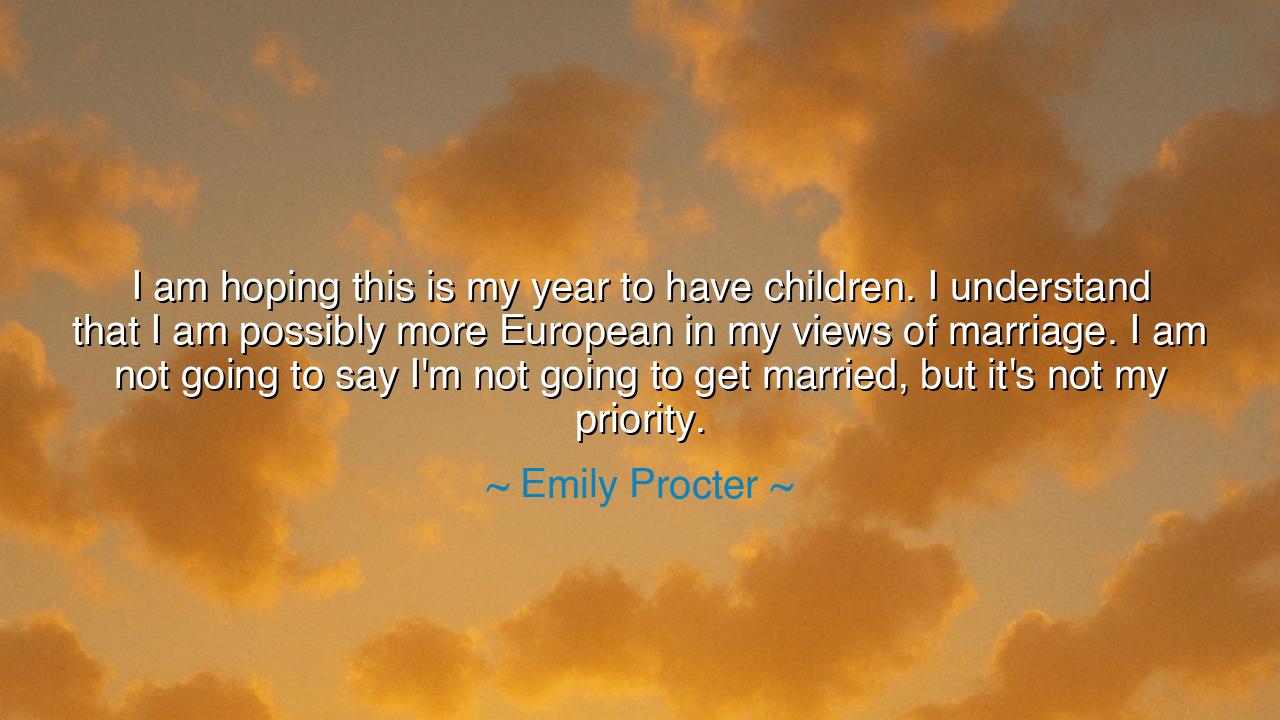
I am hoping this is my year to have children. I understand that I
I am hoping this is my year to have children. I understand that I am possibly more European in my views of marriage. I am not going to say I'm not going to get married, but it's not my priority.






In the heartfelt and reflective words of Emily Procter, we find a vision of womanhood that is both tender and defiant: “I am hoping this is my year to have children. I understand that I am possibly more European in my views of marriage. I am not going to say I’m not going to get married, but it’s not my priority.” These words, though gentle in tone, carry the quiet strength of a woman reclaiming the order of her own life. They speak of choice, of independence, and of the enduring desire to nurture life without surrendering selfhood. In them echoes the voice of many who, across time and culture, have dared to shape destiny according to authentic purpose rather than convention.
The origin of these words lies in a modern age where the meaning of family, love, and fulfillment is being reborn. Emily Procter, known for her grace on screen and her intelligence beyond it, spoke these words not as rebellion, but as truth—a truth that many women of her time had begun to rediscover. The European view of marriage she refers to is one that sees union not as a necessity for identity, but as a choice among equals, undertaken when it deepens the life already being lived. It reflects a world where love is not bound by obligation, and motherhood is not dependent on matrimony. In her statement, we hear the voice of a generation seeking not to discard tradition, but to refine it—to make it more human, more honest, more free.
Her words remind us that the call to nurture—to bring forth life, whether through children, art, or compassion—is a sacred calling that belongs to the individual soul, not to societal decree. The ancients, too, spoke of such autonomy. In ancient Sparta, women were taught that their greatest strength lay not only in bearing children, but in raising them with courage and wisdom. Their value did not depend upon marriage alone, but upon their contribution to the spirit of the community. So too does Procter’s belief reflect a timeless truth: that motherhood is not a role bestowed by ceremony, but a power awakened by purpose.
Her words also challenge the false hierarchy that has long ranked love, marriage, and motherhood in rigid order. She does not reject marriage, but she refuses to treat it as the pinnacle of worth. In her wisdom, she knows that a woman’s completeness does not hinge on another’s presence, but on the fullness of her own becoming. Such thinking is not rebellion, but balance. For love, in its truest form, can only flourish between whole beings—those who have first found peace within themselves. To marry without knowing oneself is to risk building a house upon sand; but to live with intention and clarity is to lay a foundation upon stone.
Consider the life of Queen Elizabeth I, who, though she never married, gave herself fully to her people, ruling England with devotion and strength. Her life, though unconventional, was not barren—it bore the fruits of leadership, courage, and legacy. Like Procter, she understood that fulfillment wears many forms. The mother who raises a child, the artist who shapes beauty, the thinker who nourishes minds—all partake in the act of creation. Thus, to choose one’s own path of giving is not selfishness—it is sovereignty.
Yet, in Procter’s words, there is no disdain for marriage, only discernment. She does not close the door on union; she simply refuses to make it her god. This is the heart of her wisdom: that life must unfold in its natural rhythm, not according to expectation. When love arrives, it should be embraced as a blessing, not a requirement. When motherhood calls, it should be answered with joy, not guilt. And when solitude endures, it should be honored as a space for becoming. For in each of these states—love, creation, solitude—the soul finds its own way to serve the divine.
So let this teaching be taken to heart, O seekers of balance: the worth of a life is not measured by the form it takes, but by the truth it embodies. Do not rush to fit the mold of another’s making. Seek instead the life that sings in harmony with your spirit. Whether you marry or walk alone, whether you raise children or sow other seeds of creation, let your choices be born of love, not of fear or convention.
For as Emily Procter teaches, to live with intention is the highest form of faith—to trust that one’s path, however different, is still sacred. Let each soul remember: the measure of greatness is not conformity, but authenticity. And in the quiet strength of those who walk their own road, the world finds its renewal.






AAdministratorAdministrator
Welcome, honored guests. Please leave a comment, we will respond soon